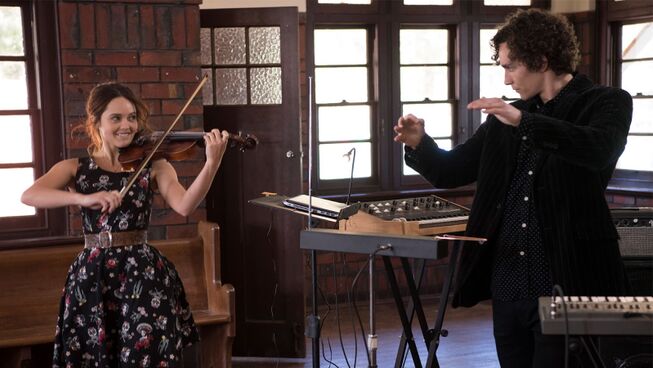
2 out of 5 stars
Festivals are great because you get to just walk around the corner and see a new band that you've heard but not had the chance to check out. Johnny Marr
At a recent talk on the subject of the film industry, The Big Picture’s Mark Hadley shared the four categories of Australian cinema. The historical epic, the confession, the nihilistic drama and the kitsch comedy were his classifications and his definitions made for a brilliant and informative talk. His commentary provided a clear distinction of the Australian influence on the cinematic world and makes reviews of these films a richer experience. Three Summers sits squarely in the kitsch comedy category, but is it in the same league with classics like Muriel’s Wedding and The Castle?
Australia’s adopted larrikin Ben Elton directs this comedic adventure over three summers at the Western Australia folk music festival, ‘Westival.’ Each year various musicians come from around the world to share their interpretation of folk music in the backwoods of Australia’s largest state. From Aboriginal dancers to an Aussie Morris dance troupe, the different representations of folk music lead to the potential of hilarious and dramatic confrontations between cultures and generations. At the heart of the story is the budding relationship between the lead singer of an Irish folk band called the Warrikins (Rebecca Breeds) and a cutting-edge Theremin player (Robert Sheehan) who pushes the boundaries of music and love.
Even though Ben Elton is an English writer/director, he does manage to capture the irreverent and self-deprecating spirit of Australian humour. Playing it against the unique atmosphere of the music festival provides a brilliant atmosphere for this clash of cultures and musical interpretations. The set up of the various stories that surround the quirky love story is good fun and engaging, but as things progress toward the sharp-edged message of asylum seekers the jocularity looses its lustre.
The cast is a menagerie of some of Australia's great comedic royalty. With Peter Rowsthorn, Magda Szubanski and Michael Caton on set, Elton merely has to allow these veterans loose with the characters to provide a hilarious mixture that provides the springboard for an excursion into true Aussie flavoured humour. Each capitalises on the talents that have made them a mainstay on the big and small screen by tapping into the perfect characters that anyone might see at the local caravan park. This constant swirl of humorous activity lightens the dramatic tension brought on by the tenuous romance between Breeds and Sheehan and the continual reminder of asylum seeker support.
The message surrounding the plight of the refugees is an important issue for our country, but the ham-fisted method of delivery was counterproductive to Three Summers. This less than subtle theme turned an uncommon and enjoyable romantic comedy into a drama with some comedy added in for good measure. Not to diminish the challenges faced by the refugees, but Elton could have delivered his message with a lighter touch and it would have achieved his goal of national awareness.
REEL DIALOGUE: What is the word on Christians and comedy?
Christians are generally depicted as the fun-police and killjoys, but this is not how God views life as a Christian. As a creation of the God of the universe, mankind is made with a range of emotions that include joy and laughter. These emotions are accompanied with charges to enjoy the creation that is around us. (Psalm 4:7; 16:11; 32:11).
All people need to do is to look around and see that humour is built into the system. The antics of children, the words of a toddler, the duck-billed platypus and even the innocent mistakes we make daily. God has given us the gift of laughter and amusement to provide a spirit that enjoys the life that has been given.
Some jokes and humour should be avoided because it does more to tear others down than build them up. These are the examples of things that are contrary to the message of God, but they should not be the catalyst for people to stop laughing. (Philippians 4:8, Ephesians 5:4).
Like all things in this world, comedy must be handled carefully and should be reflective of the gift that it was intended to be. Truly enjoyable and uplifting humour is a godly thing that should be enjoyed. God does want us to enjoy life, just not at the expense of others. (John 15:11).








